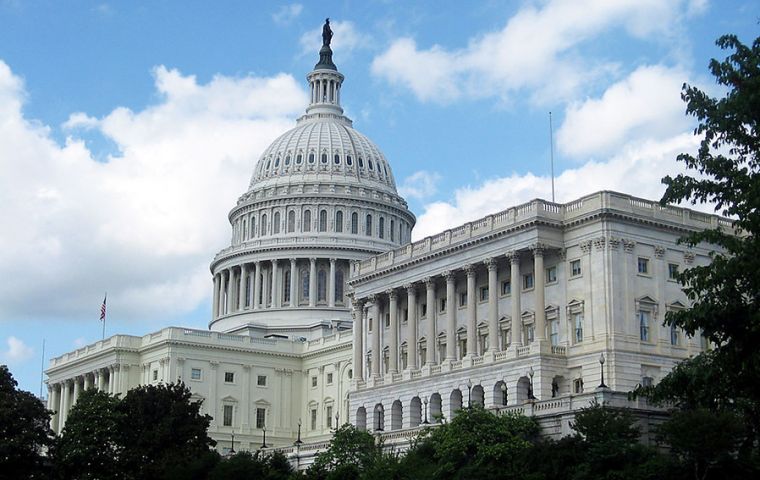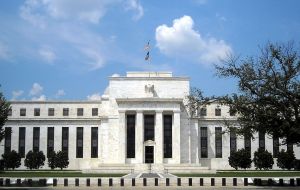MercoPress. South Atlantic News Agency
A debt agenda for G7 meeting in Japan
 In the United States, the Congressional Budget Office estimates that the federal government debt doubled over the past decade, from 36% of GDP to 74% of GDP.
In the United States, the Congressional Budget Office estimates that the federal government debt doubled over the past decade, from 36% of GDP to 74% of GDP.  Japan is worse, with gross debt at more than 200% of GDP. Japan’s current annual deficit of 6% of GDP implies that the debt ratio will continue to rise rapidly
Japan is worse, with gross debt at more than 200% of GDP. Japan’s current annual deficit of 6% of GDP implies that the debt ratio will continue to rise rapidly  Central banks can help by announcing clearly that interest rates will rise substantially in the future, making it more expensive for governments to borrow
Central banks can help by announcing clearly that interest rates will rise substantially in the future, making it more expensive for governments to borrow  In the US, there is scope to raise revenue without increasing tax rates, by limiting so-called tax expenditures – the forms of spending that are built into the tax rules
In the US, there is scope to raise revenue without increasing tax rates, by limiting so-called tax expenditures – the forms of spending that are built into the tax rules  An American who buys an electric car receives a US$7,000 tax reduction. Larger tax expenditures in the US include the deduction for mortgage interest
An American who buys an electric car receives a US$7,000 tax reduction. Larger tax expenditures in the US include the deduction for mortgage interest By Martin Feldstein - On May 26-27, the heads of the Group of Seven leading industrial countries will gather in Japan to discuss common security and economic problems. A major common problem that deserves their attention is the unsustainable increase in the major developed countries’ national debt. Failure to address the explosion of government borrowing will have adverse effects on the global economy and on debt-burdened countries themselves.
The problem is bad and getting worse almost everywhere. In the United States, the Congressional Budget Office estimates that the federal government debt doubled over the past decade, from 36% of GDP to 74% of GDP. It also predicts that, under favorable economic assumptions and with no new programs to increase spending or reduce revenue, the debt ratio ten years from now will be 86% of GDP. Even more worrying, the annual deficit ratio will double in the next decade to 4.9% of GDP, putting the debt on track to exceed 100% of GDP.
The situation in Japan is worse, with gross debt at more than 200% of GDP. Japan’s current annual deficit of 6% of GDP implies that the debt ratio will continue to rise rapidly unless action is taken.
Conditions differ among the Euro zone countries. But three of the European Union’s four largest economies – France, Italy, and the United Kingdom – all have large debts and annual deficits that point to even higher debt ratios in the future.
A rising level of national debt absorbs funds that would otherwise be available to finance productivity-enhancing business investment. Businesses now fear that the increasing deficits will lead to higher taxes, further discouraging investment.
That is a worrying prospect for everyone. When interest rates rise, as surely they must, the cost of servicing the debt will require higher taxes, hurting economic incentives and weakening economic activity. And the persistence of large deficits reduces the room that governments have to increase spending when there is an economic downturn or a threat to national security.
Reducing deficits is obviously a task for those responsible for tax revenue and public spending: governments and legislatures. But central banks also play a role, affecting the problem in two ways. Low-interest-rate policies in advanced countries are depressing the current size of budget deficits, but at the cost of reducing pressure on political leaders to address future deficits and encouraging voters to favor more spending programs and larger tax cuts. Central banks can help by announcing clearly that interest rates will rise substantially in the future, making it more expensive for governments to borrow and to roll over existing debt.
Reducing annual deficits requires either increased tax revenue or decreased outlays. Raising marginal tax rates is both politically unpopular and economically damaging. In the US, there is scope to raise revenue without increasing tax rates, by limiting so-called tax expenditures – the forms of spending that are built into the tax rules rather than appropriated annually by Congress.
For example, an American who buys an electric car receives a US$7,000 tax reduction. Larger tax expenditures in the US include the deduction for mortgage interest and the exclusion from taxable income of employer-paid health-insurance premiums.
Although eliminating any of these major tax expenditures might be politically impossible, limiting the amount by which a taxpayer could reduce his or her tax liability by using these provisions could raise substantial revenue. So I do my best to persuade my Republican friends in Congress that reducing the revenue loss from tax expenditures is really a way to cut government spending even though the deficit reduction appears on the revenue side of the budget.
The good news is that a relatively small reduction in annual deficits can put an economy on a path to a much lower debt-to-GDP ratio. For the US, cutting the deficit from the projected 4.9% of GDP to 3% of GDP would cause the debt ratio to drop toward 60%.
The same is true elsewhere. The long-run debt-to-GDP ratio is equal to the ratio of the annual budget deficit to the annual rate of growth of nominal GDP. With 4% nominal GDP growth, a budget deficit of 2% would bring the long-term debt ratio down to 50%. That should be the goal for which all of the G7 countries aim. (Project Syndicate)




Top Comments
Disclaimer & comment rules-

-

Read all commentsNational debt doubled - the Obammy legacy - and still no recovery.
May 27th, 2016 - 03:09 am 0At least trump has got'em all rattled.
Why do they call it the G7 when 6 are officially on the list, the EU taking up two places as one.
May 27th, 2016 - 06:56 pm 0What's it to do with them.
Commenting for this story is now closed.
If you have a Facebook account, become a fan and comment on our Facebook Page!